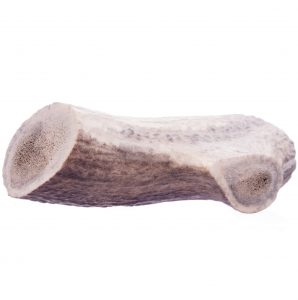Antler Chews for Dogs: A Beginner's Guide
We all know that dogs love to chew, but unfortunately, some of the things they want to chew on may not be safe for them. We also know that puppies need to chew while they are teething and in fact, many adults continue to chew through adulthood.
For some dogs, chewing is an outlet for their energy or a way to reduce stress. For others, it is simply fun! As pet parents, we are always looking for the “perfect” chew toy. To be perfect, it must be safe for our dog to chew, able to hold their interest, and hopefully one that won’t be destroyed too quickly. Finding the perfect chew can be quite a challenge, especially if you share your home with a dog that is an aggressive chewer.
All of the antlers that Jeffers carries are 100% naturally shed North American deer and elk antlers. These antlers last extremely well, giving your dog many hours of chewing enjoyment.

An example of a Full Antler Chew
Antler Features & Benefits:
There are a variety of reasons that chewing antlers can be good for your dog. These include:- Odorless
- Allergy-friendly
- can help clean teeth
- massage gums
- exercise jaws
- dye- and preservative-free
Additionally, antlers provide a natural source of collagen, calcium, phosphorous, and other nutrients. Split antlers are a great option for puppies and mature dogs or dogs with soft mouths. Also referred to as the Trew, split antlers expose the bone marrow for easier access to the antler’s yummy center.
An example of a Split Antler Chew
Did You Know?
Antlers start out as layers of cartilage and slowly mineralize into bone? Most antlers grow an inch per day, and as they become large, the velvet begins to grow. The blood flow slowly lessens and they become bone. Every year, when the antlers reach full growth, the animal naturally sheds them. The older the animal, the more “points” it is able to grow. Because of the fast cell growth that occurs naturally in antlers, scientists are using them for research into cures for many diseases, including cancer!
More Antler Chew Tips
Be certain the antler you choose is the appropriate size for your dog. (See chart below) Take the antler away from your dog if they are biting hard enough to break it. As with all treats, please supervise chewing. Pro Tip: If your dog is not initially interested in the antler, rub it with sandpaper or soak it in water or bouillon overnight.
Antler Chews: Which Size is Right for My Dog?
Approximate Weight of Dog |
Antler Size |
Antler Size (Split) |
| Under 15 pounds | Small | Medium |
| 15 to 30 pounds | Medium | Large |
| 30 to 45 pounds | Large | Jumbo |
| 45 to 60 pounds | Jumbo | Jumbo or Monster |
| Over 60 pounds | Monster | Monster |
Read more about bones and natural treats in our blog post "Game of Bones: Winter is Coming".
Renee Jones, CPDT-KSA is a certified professional dog trainer, having received instruction from canine behaviorist Dr. Pamela Reid, plus nationally acclaimed trainers: Patricia McConnell, Pia Silvani, and Jean Donaldson, to name a few. She is a member of the Association of Professional Dog Trainers (APDT) and the International Association of Animal Behavior Consultants (IAABC). She serves as a Pet Marketing and Canine Specialist for Jeffers Pet and JeffersPet.com.
Questions about this article, training, or non-emergent health concerns are welcome. Renee can be reached most weekdays (M-F) from 9 AM – 5 PM (Central Time) at 1-800-533-3377 (1-800-JEFFERS) ext. 381 or by email at rsjones@jefferspet.com.
